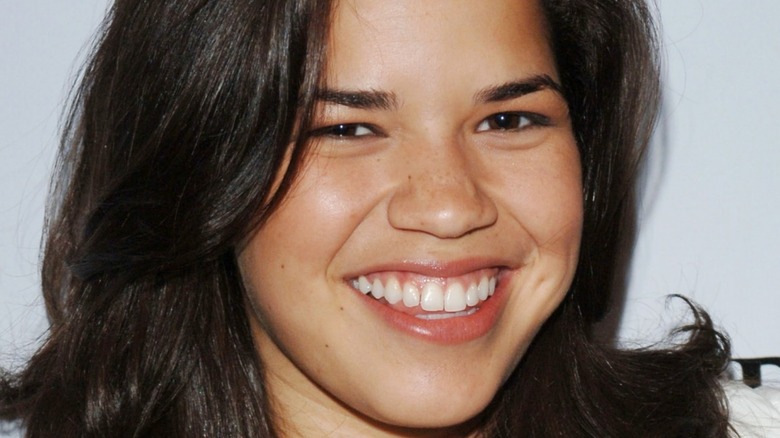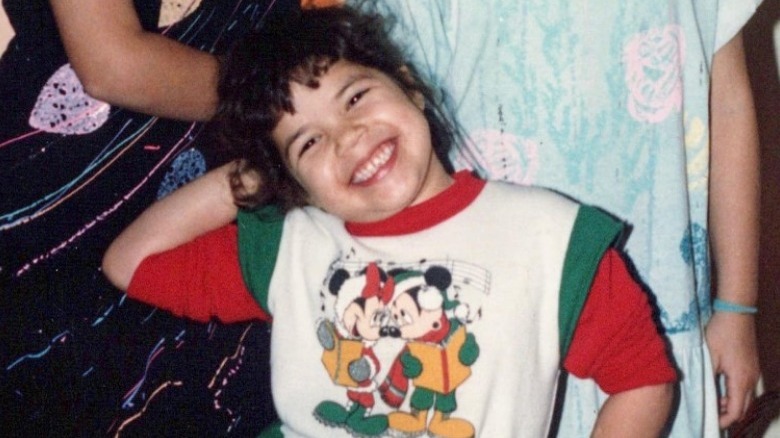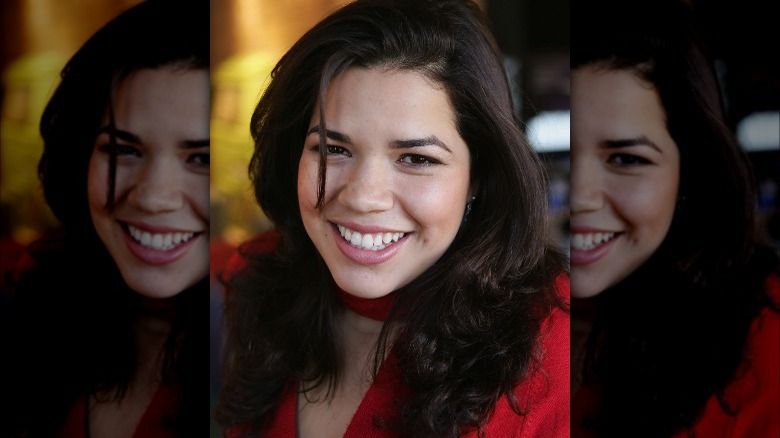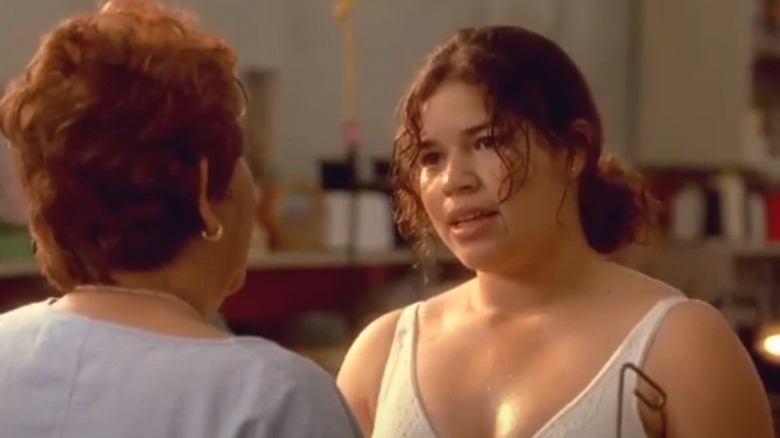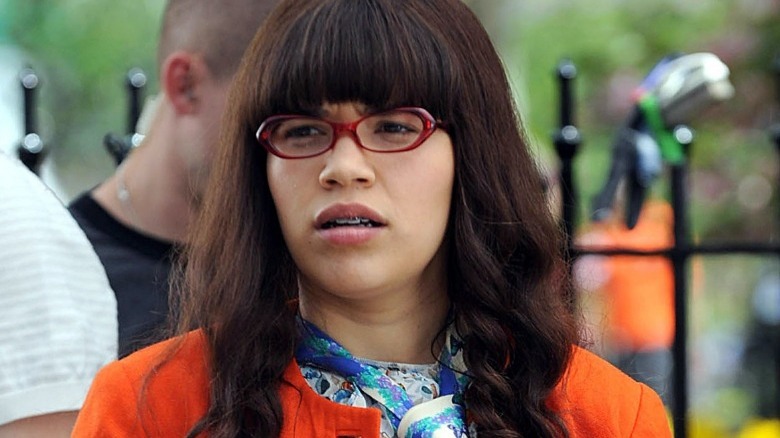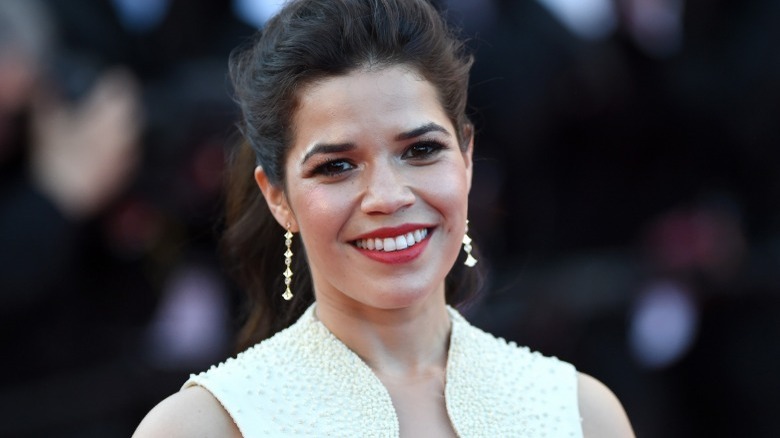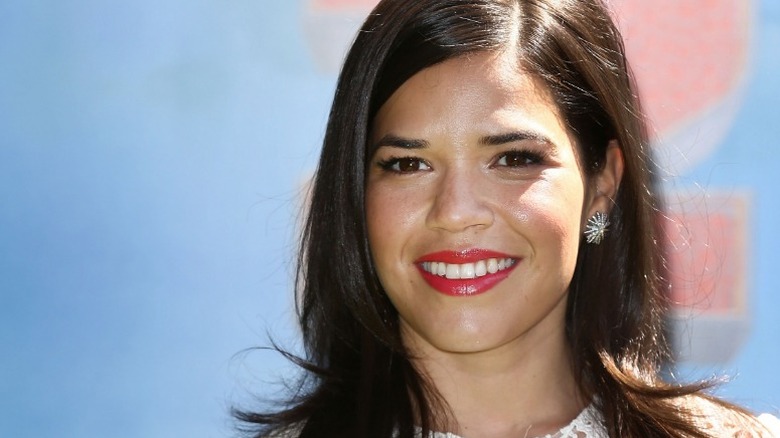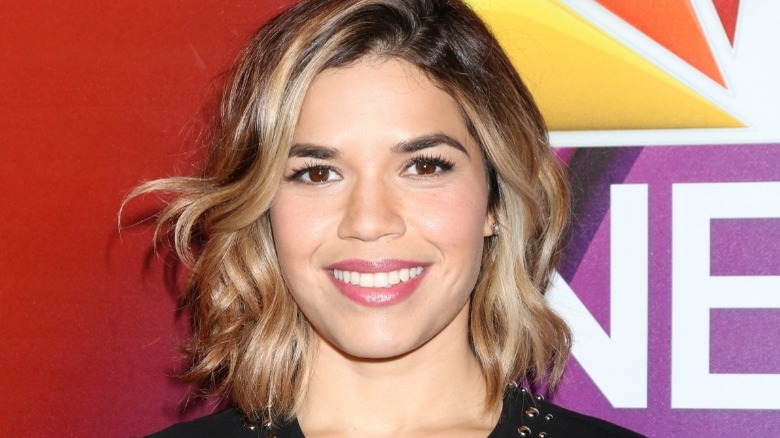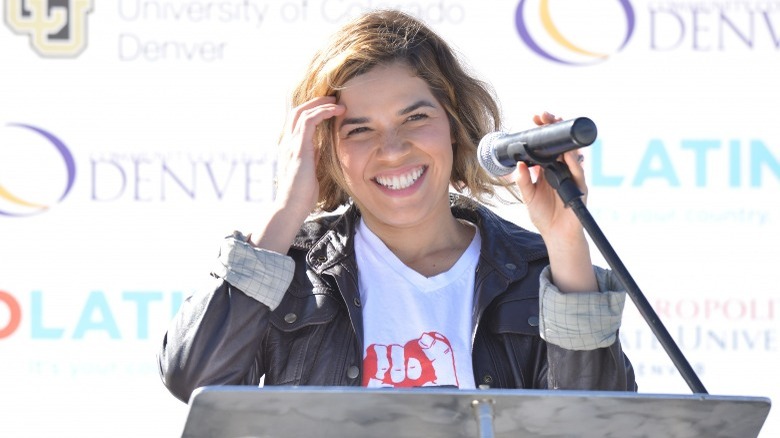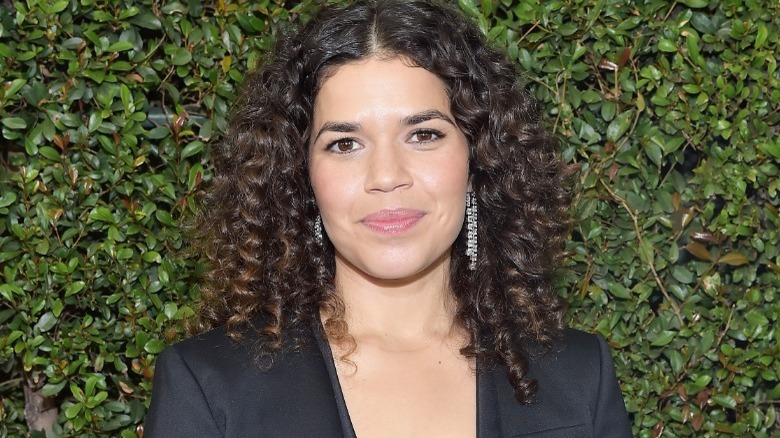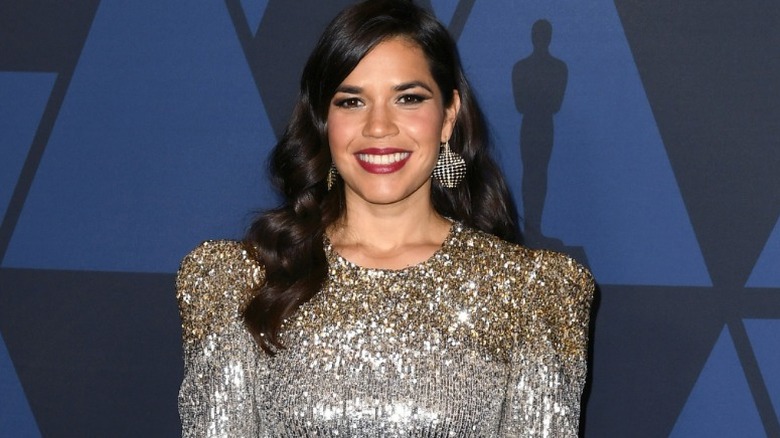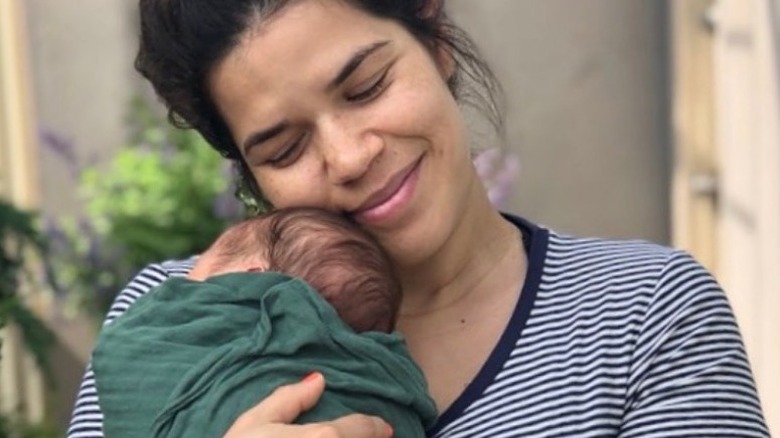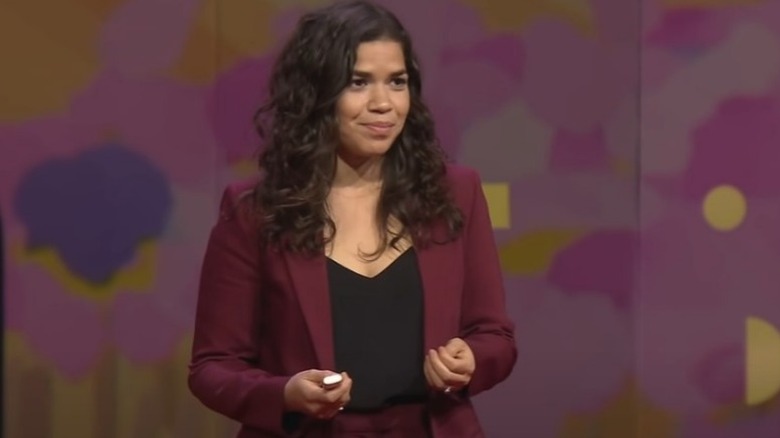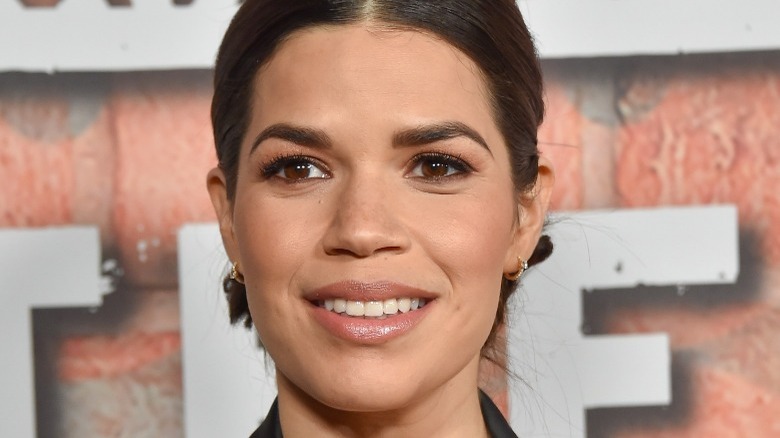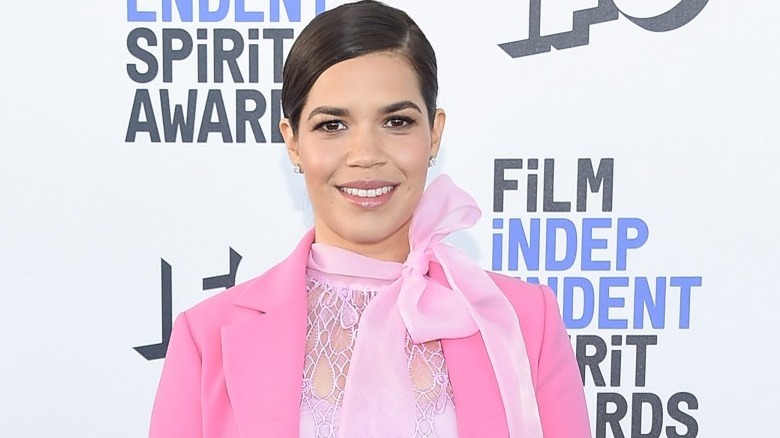America Ferrera's Transformation Is Seriously Turning Heads
We may receive a commission on purchases made from links.
America Ferrera was only 17 when she burst onto the Hollywood scene as Ana Garcia in "Real Women Have Curves," a film that celebrated body positivity before it became mainstream. The Latina actress then stole television audiences' hearts as Betty Suarez in "Ugly Betty," for which she won multiple awards. Like Ana in "Real Women," Betty depicts a young Hispanic American woman navigating the world of culture and identity, searching for a place to belong.
While Ferrera has long sought to tell stories of Latino culture with depth and nuance, the characters she chooses to play, and the authenticity with which she portrays them, speak to people of all backgrounds. As Ferrera explains in the foreword of "American Like Me: Reflections on Life Between Cultures," "We should all be able to look at the world around us and see a reflection of our true lived experiences. Until then, the American story will never be complete."
Once afraid she wasn't checking off the right box, the award-winning superstar now checks so many it's hard to keep up. Throughout her career, she has proven that identity is multi-dimensional and ever-evolving, a kaleidoscope of shapes and colors constantly emerging and changing. From A-list actress to inspirational activist, here's America Ferrera's stunning evolution.
At 7, America Ferrera became estranged from her father
The youngest of six children and the daughter of Honduran immigrants, America Ferrera was born and raised in Los Angeles' San Fernando Valley (per W Magazine). When she was 7, her parents divorced, and her father moved back to Honduras and later died in 2010, according to TV Guide. After her parents' separation, Ferrera never saw or spoke to her father again. In a 2007 interview with the British version of Marie Claire (via People), she recalled, "It wasn't until I was older that I thought, 'Damn, I never really grieved over that.'"
Her mother, who was then director of housekeeping at a Hilton hotel, became the family's sole provider, according to W Magazine. Though her mother made a decent living, with six children to support on her own, money stretched only so far. In an intimate chat with Reese Witherspoon, which was featured in a 2018 episode of the docuseries "Shine On with Reese," Ferrera remembered asking her mother as a child if the family was poor. Her mother explained that, compared to others, "who make minimum wage for backbreaking work," they were fortunate. This perspective was eye-opening, Ferrera told Witherspoon. "That really trained me to see people."
She caught the acting bug at a young age
From the age of 7, when she was cast in her first play, "Hamlet," America Ferrera knew she wanted to be an actress (via TV Guide). As she wrote in the foreword to "American Like Me: Reflections on Life Between Cultures," "I acted wherever anyone would let me — in school, the local community college, and free community theater programs. I spent one summer riding three buses to get from the Valley to Hollywood in order to play Fagan's Boy #4 in a community theater production of 'Oliver!'"
But she soon realized Hollywood wasn't ready for a Latina leading lady, at least not one who contradicted popular stereotypes. As a starry-eyed ingenue, she learned to conform, albeit reluctantly. "Shape-shifting was a useful skill to possess as an aspiring actress," she writes in the book's foreword, "but it didn't stop people from labeling and categorizing me." She continued: "In fact, when people found out that my dream was to become an actress, they made it their duty to remind me of who I was ... and who I wasn't."
That included her mother, who, afraid of the rejection her daughter would face, encouraged Ferrera to pursue a different vocation (per Contactmusic.com). It turned out, however, that this experience — the conflict between what Ferrera wanted for herself and what others wanted for her — would prepare her for her biggest role yet.
She had a breakout role in Real Women Have Curves
America Ferrera was 17 when she landed the role of Ana Garcia in "Real Women Have Curves," a coming-of-age tale about a teenage Mexican American girl who wants to go to Columbia University but whose mother insists she stay in Los Angeles to work at her sister's dress shop. Ana is smart and charming, beautiful and — as the title implies — shapely.
In one scene, Ana, working in her sister's shop on a hot summer day, takes off her shirt as her mother, who nettles Ana about her weight, looks on in horror. The other female employees, all of whom are also curvy, dress down to their undergarments as well, proudly comparing stretch marks and cellulite. This is the essence of the movie's conceit, and it beautifully encapsulates Ferrera's motive as an actress: People, no matter who they are or what they look like, deserve to be seen.
The 2002 film was critically and publicly acclaimed, earning Ferrera an Independent Spirit Award nomination. Speaking to Glamour in 2007, Ferrera recalled that one of her fondest memories about the movie was how it resonated with audiences around the globe. "We screened the film all over the world," she explained, "in Jewish communities, Black communities, Greek communities, German communities — and people across the board said, 'That's my family.'"
The Latina actress cemented her fame with Ugly Betty
America Ferrera starred in multiple productions following her feature film debut in "Real Women Have Curves." But it wasn't until ABC's "Ugly Betty," which premiered in 2006, that she staked her claim as a Hollywood leading lady. On the show, Ferrera plays Betty Suarez, a young aspiring writer who lands a position at an elite fashion magazine in New York. With her big smile — braces on full display — bushy eyebrows, and red-rimmed glasses, she's a stark contrast to the svelte models around her. Nonetheless, she exudes confidence and charm.
"Ugly Betty" was an instant success, netting multiple awards and an Emmy for Ferrera. It marked the first time a Latina had won the award in the lead actress category (per E! News). She also won a Golden Globe and a SAG Award that year, reported W Magazine.
At 22, Ferrera was making inroads in Hollywood, not just for Hispanic actresses but for women who fell outside the conventional standards of beauty. Her characters persevered not in spite of their looks, but because of them. Rather than their looks being an obstacle, they became a source of empowerment. In her Golden Globe acceptance speech for "Ugly Betty," Ferrera told the audience, "It's such an honor to play a role that I hear from young girls on a daily basis how it makes them feel worthy and loveable, and that they had more to offer the world than they thought."
America Ferrera became an international activist
In 2012, America Ferrera teamed up with The New York Times' Nicholas Kristof, along with other celebrity activists, for a PBS documentary called "Half the Sky: Turning Oppression into Opportunity for Women Worldwide." Ferrera's portion covers sex trafficking in India. At one point, she breaks down and cries, saying to the camera, "What's hard about being on the other side of the world is that sometimes the problem feels so big that changing one life doesn't feel like enough. But it is. If you're that one girl who got rescued, it matters."
After shooting the documentary, Ferrera felt compelled to do more. That same year, she visited her parents' birthplace in Honduras with the charity group One Campaign (per Twitter) to raise funds for women living in poverty there. At a screening for the documentary in New York, Ferrera told the audience she discovered during her trips to India and Honduras that, even though we are all different, we still have the same fundamental needs: "to be loved and to be able to protect ourselves and our families" (via Female First).
After 10 years, she earned her college degree
America Ferrera was one year away from earning her bachelor's degree in international relations at the University of Southern California when she was offered her lifechanging role in "Ugly Betty." Torn between acting and activism, she almost didn't accept the role, until a professor told her a story about a Latina student coming into his office and explaining to him that watching "Real Women Have Curves" was the first time she felt someone understood her immigrant experience (via USC Dornsife). In that moment, Ferrera realized she didn't have to choose — she could make a difference as both an actress and an activist.
She took a leave of absence from school to do "Ugly Betty" but returned after the series wrapped six years later. Just before graduation, in May 2013, she took to Twitter to share her excitement, posting, "I'm walking in my college graduation in 3 days from @USCDornsife! It's finally happening! Took me 10 years, but it feels great."
It may have taken Ferrera longer than most to earn a college degree, but if she's proven one thing, it's that being different is an asset.
She spotlighted diversity in Superstore
America Ferrera's next hit television series wasn't too far behind "Ugly Betty." In 2015, Ferrera starred as the lead, Amy Sosa, in NBC's "Superstore," via IMDb. Though the big-box-store setting (think Walmart) amplifies the show's humor, the real appeal is the cast, a group of misfits who, despite their differences — from age to race, sexual orientation to physical ability — becomes a type of dysfunctional family.
A common theme in Ferrera's work isn't just diversity, however; it's that her characters don't define themselves by their differences. What lies on the surface is a small part of their world, negligible to their value as a person. In a 2017 interview with Vulture, Ferrera, who also executive produced many episodes of "Superstore," explained, "I feel driven, as a woman of color who has access, to use that to create opportunity for certain stories that other people may not be paying attention to."
The 2016 presidential race kicked her political activism into high gear
America Ferrera became a prominent face of the Democratic Party in the 2016 presidential race, after hearing Donald Trump's disparaging remarks about Mexicans being criminals and rapists (via BBC News). Ferrera, the daughter of Latin American immigrants, later said in a 2018 clip, via Makers, that his comments were so offensive as to feel like "a death."
Galvanized by her anger, Ferrera, along with a host of other celebrities, endorsed Hillary Clinton's 2016 presidential bid against Trump (per BBC News). Ferrera spoke at several of Clinton's rallies across the country, determined to make an appeal to Hispanic voters. At Clinton's final pre-caucus rally in Nevada against Bernie Sanders, Ferrera told the crowd her reasons for supporting Clinton: "Maybe [it's] because I am an American Latina who has experienced first hand the kind of inequities Hillary has spent her career trying to fix" (via the Daily Mail). She continued, "Hillary stood with Latinos even before the Latino vote was desirable."
Following the 2016 presidential election, America Ferrera founded a nonprofit
As an avid supporter of Hillary Clinton, America Ferrera had a difficult time accepting Donald Trump's victory as the 45th president of the United States. The night after Trump's win, Ferrera took to Instagram, posting a teary-eyed photo of herself. "The grief comes in waves," she wrote in the photo's caption (via HuffPost). "If you cried all day — you are not alone. We deserve to mourn." She added, "Patiently waiting for the sadness to transform into something more useful."
Ferrera apparently took those words to heart. Not long after her Instagram post, she and her husband, Ryan Piers Williams, along with Latino star Wilmer Valderrama, started a nonprofit called Harness. The organization is a grassroots effort to bring marginalized groups together and collaborate on social justice action. Ferrera explained in a 2018 interview with Marie Claire that surrounding herself with people advocating for positive change grounds her and inspires her when the world feels dark. "I gain strength and encouragement from those around me who are being courageous, and brave, and stepping out," she said. "I need them to keep doing that, because it's what keeps me going."
She helped start Time's Up to end workplace sexual harassment
After the Harvey Weinstein scandal broke in 2018, in which he was accused and later convicted of multiple sex crimes, women from all corners of the world flooded the internet with their experiences of sexual abuse, prompting the global social movement known as #MeToo.
Even America Ferrera, who is generally reserved speaking about her personal life publicly, shared her own story of being sexually assaulted as a child. "I told no one and lived with the shame and guilt thinking all along that I, a [9-year-old child], was somehow responsible for the actions of a grown man," she wrote in an Instagram post (via Variety).
The #MeToo movement became a clarion call for an end not just to sex crimes against women but to the broader gender discrimination they face in society, such as disparities in pay and unequal job opportunities. Ready for change, Ferrera joined 300 influential women — writers, actresses, producers, to name a few — in 2018 to launch Time's Up, an initiative to combat workplace sexual harassment and gender power imbalances. As Ferrera told The New York Times, "Not taking action is no longer an option."
If you or anyone you know has been a victim of sexual assault, help is available. Visit the Rape, Abuse & Incest National Network website or contact RAINN's National Helpline at 1-800-656-HOPE (4673).
Motherhood has only energized her
As if 2018 weren't eventful enough for America Ferrera, she and her husband welcomed their first child, a son named Sebastian (per People). For a workaholic like Ferrera, taking time off was tough, but, as she told Health in a 2020 interview, "I needed that for myself." She also feared losing her ambition, that time away from her nonstop lifestyle might cause her to "never care about anything else ever again."
But this is America Ferrera we're talking about. As she explained in the Health interview, when a friend called needing help for a social justice cause, Ferrera, still on maternity leave and breastfeeding, jumped at the chance. "It was a relief to know that who I am at my core was not altered," she said. "Actually, that's not true. It's not accurate that I wasn't altered. In a way, having [my son] made everything more important."
Ferrera gave birth to a second child, a daughter named Lucia, in May 2020, when much of the world was still in lockdown from COVID-19. But that didn't faze Ferrera, who, in an Instagram post, referred to 2020 as "a worthy challenger." Now, that's grit!
She gave a TED talk about the power of identity
America Ferrera's childhood dream was to be an actress. As she explained in a 2019 TED talk, it wasn't the fame and glam that appealed to her: It was the opportunity to tell deeply human stories about complex and messy people. But she naively thought that these kinds of roles were accessible to anyone of any background. It turned out, however, that the film industry thought otherwise.
So, she told the audience, she transformed herself to fit Hollywood's standards — that is, to look, speak, and act less Latina. She avoided the sun so her skin wouldn't turn "too brown." She tried to lose weight; she "straightened [her] hair into submission." If she disguised her real self, she thought, others would see she was capable. "I didn't need my dream to be easy," she said. "I just needed it to be possible."
With the worldwide success of "Real Women Have Curves" and "Ugly Betty," both of which feature a Latina leading lady, she thought the industry would take note. But it didn't — at least not to a significant degree. And Ferrera understood why: "I was never asking the system to change," she said in her speech. "I was asking it to let me in."
Now an established actress, Ferrera is done conforming. She concluded her TED talk with this cogent message: "My identity is not my obstacle ... my identity is my superpower."
The Ugly Betty star paved the way for Hispanic storytellers
Even though Hollywood seemed more interested in perpetuating stereotypes about certain cultures, America Ferrera knew that people, especially those who never saw themselves reflected onscreen, were hungry for the stories she wanted to tell. So, she decided to create them herself.
While Ferrera has racked up a slew of production credits, "Gentefied," a show about three Mexican American cousins trying to save their grandfather's taco shop from a gentrifying neighborhood in Los Angeles, was a defining moment for television — as well as for Ferrera, who helped get the series off the ground, producing three episodes in the first season. The show was one of the first to spotlight not just Latino actors but Latino stories told by Latino creators. The Netflix series, written by Marvin Lemus and Linda Yvette Chávez, debuted in 2020 to glowing reviews. Ferrera said on "The Late Show with Stephen Colbert" that working on "Gentefied" was "a dream come true," adding, "It's this story about humanizing the families and the lives and the people behind what most know as headlines and statistics."
"Gentefied" ran for two seasons, but, unfortunately, was canceled in early 2022 (per Variety).
She learned to have a healthy body image
After two decades of fighting to fit in with a system that didn't accept her for who she is, America Ferrera finally grew comfortable in her own skin. Just as she has inspired others to embrace their heritage, she has been a beacon of body positivity by promoting messages of self-acceptance. For instance, in a 2017 Instagram post (via Life & Style), she wrote, "After too many years of criticizing, punishing, depriving or neglecting my body for what it isn't, I'm attempting to love it unapologetically as it is."
Like all women, her body has morphed with the different phases of her life, giving her what she needed in that moment. Even with motherhood, she has learned to "try to go easy on [herself]" (per Health). As for where she sees herself in her ongoing journey of coming into her own, she told Latina Magazine in 2021, "In 20 years, I want to feel more in my body, more joy, more comfort with all the things that I am. More able to walk into any room exactly as I am, and to feel true ownership of myself and my power, with no apology."
